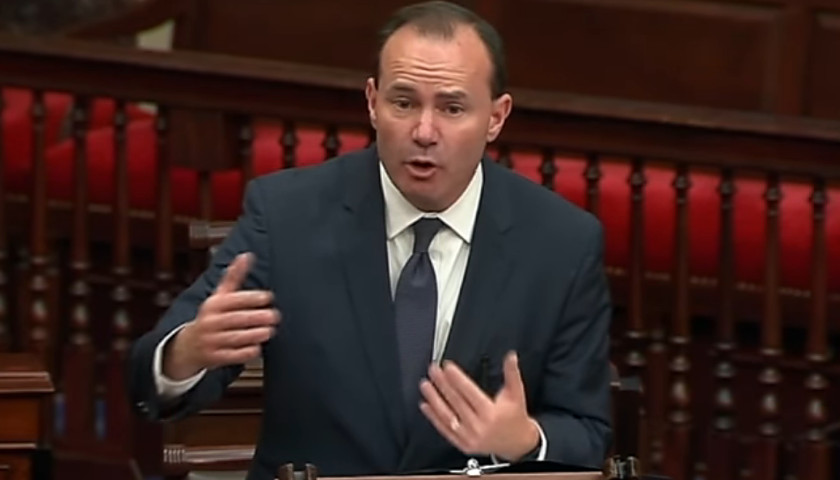A bill that would enshrine same-sex marriage in federal law progressed further in the Senate Monday evening with significant Republican support, but without sufficient religious liberty protections, and is now headed to a vote on Tuesday.
Bad news: The RFMA—without sufficient protections for religious liberty—just progressed further in the Senate.
Good news: There's still time to adopt my amendment and protect the religious liberties enshrined in the First Amendment.
— Mike Lee (@SenMikeLee) November 29, 2022
The Senate voted, 61-35, with four senators not voting, to end debate on the House-passed bill, dubbed the Respect for Marriage Act (RFMA), that would repeal the Defense of Marriage Act which defined marriage in federal law as between one man and one woman.
The fact that the measure garnered more than 60 votes of approval means it avoided a filibuster.
Senator Mike Lee (R-UT), who voted against the legislation, posted that, while the “bad news” is that the bill advanced further “without sufficient protections for religious liberty,” the “good news” is “there’s still time to adopt my amendment and protect the religious liberties enshrined in the First Amendment.”
Lee explained in an op-ed published Monday at Fox News why his religious liberty amendment is needed:
While the tension between same-sex marriage and religious liberty might not be obvious to many, legal experts have long understood that there is a legitimate risk that, without robust protections in place, federal recognition of same-sex marriage could – read against the backdrop of various federal statutes and the way they have been interpreted by the Supreme Court – inflict harm on those who, for reasons rooted in sincerely held religious belief or moral conviction, do not embrace same-sex marriage.
Without sufficient religious liberty protections, Lee wrote that, once same-sex marriage is enshrined in federal law, “many colleges, universities and other nonprofits could lose their tax-exempt status based on their refusal, rooted in religious belief, to recognize same-sex marriage.”
Lee called the amendment to protect religious freedom, offered by Senators Tammy Baldwin (D-WI), the first openly gay senator, and pro-abortion-rights Susan Collins (R-ME), as “woefully insufficient” to provide religious freedom protections.
— Mike Lee (@SenMikeLee) November 16, 2022
“Religious Americans will be subject to potentially ruinous litigation, while the tax-exempt status of certain charitable organizations, educational institutions, and non-profits will be threatened,” he asserted.
“My simple, commonsense amendment would prohibit the federal government from retaliating against any person or group for adhering to sincerely held religious beliefs and moral convictions about marriage,” Lee wrote, explaining further:
Under the RFMA’s current language, many religious schools, faith-based organizations, and other nonprofit entities adhering to traditional views of marriage would be at risk of losing tax-exempt status and access to a wide range of federal programs. Many small businesses would also be affected. For example, wedding vendors (including kosher caterers) would be subjected to endless lawsuits and harassment based solely on their beliefs.
Lee said he fears the legislation, without his robust amendment, “would only “exacerbate and nationalize the discriminatory policies already in place in Illinois, Massachusetts, California and the District of Columbia, where religious adoption agencies are essentially shut down unless they recognize same-sex marriage.”
“My amendment adds protections without creating the type of zero-sum dynamic – a virtual tug-of-war between same-sex marriage and religious freedom – that would surely follow from the bill’s passage in its current form,” the senator asserted.
Lee wrote his amendment should be a “no-brainer,” considering he has not heard from any member of Congress, whether for or against the measure, who is arguing in favor of government discrimination against Americans of faith.
“Congress can recognize the ongoing validity of same-sex marriage without trampling on the First Amendment rights of those who believe in traditional marriage,” he continued. “Unfortunately, the current language of the RFMA does not strike that balance. Instead, it elevates the rights of one group at the expense of another.”
“My amendment, which would allow the RFMA to accommodate both interests, should be adopted immediately,” Lee concluded. “I urge my colleagues to oppose the RFMA unless or until it has been.”
The Star News Network reached out to Lee’s office for further comment and is awaiting a response.
– – –
Susan Berry, PhD is national education editor at The Star News Network. Email tips to [email protected].






